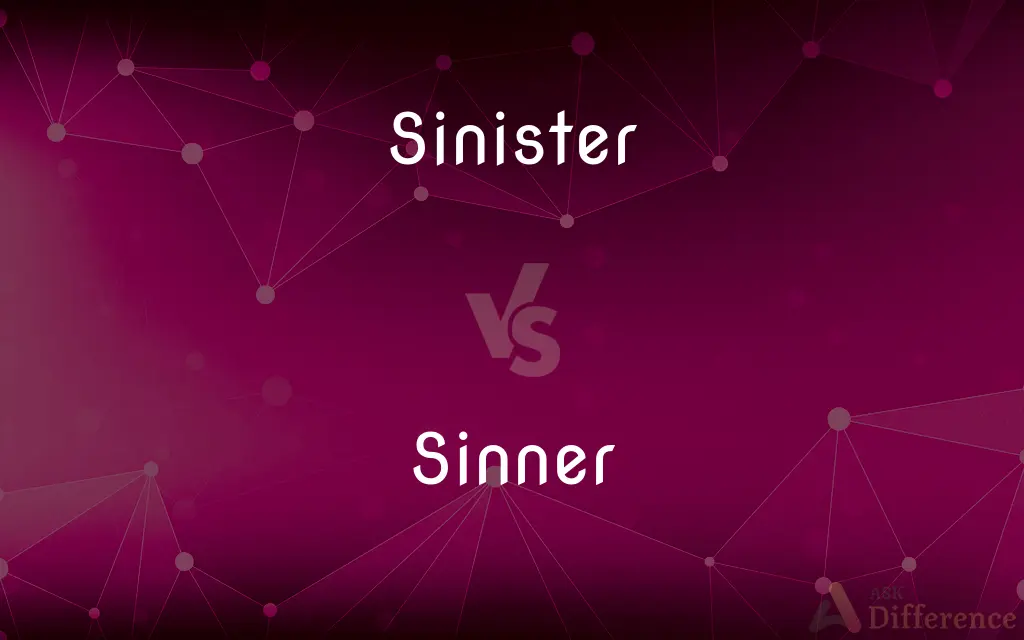Sinister vs. Sinner — What's the Difference?
By Fiza Rafique & Maham Liaqat — Updated on April 3, 2024
Sinister describes something ominous or evil, while a sinner refers to a person who commits a moral wrong.

Difference Between Sinister and Sinner
Table of Contents
ADVERTISEMENT
Key Differences
Sinister primarily conveys a sense of foreboding or ill intent, often associated with darkness or the left side historically, suggesting something or someone threatening or malevolent. On the other hand, sinner specifically denotes an individual who transgresses against divine law by committing an act deemed as a sin, focusing on the moral and ethical dimensions of human behavior.
While sinister can describe an atmosphere, situation, or character trait indicating potential harm or evil, a sinner is centered around the concept of sin, reflecting personal actions that violate moral or religious norms. This distinction highlights sinister’s broader application to non-human entities and abstract concepts, whereas sinner is exclusively human-centered.
Sinister has its roots in Latin, originally meaning "left" but evolving to signify unlucky or inauspicious, thus acquiring its modern association with evil. In contrast, sinner comes from Old English synn, related to sin, a term deeply embedded in religious contexts, emphasizing the moral failing or fault of an individual.
The connotation of sinister encompasses a wide range of negativity, from merely unlucky to profoundly evil, capable of being applied to places, objects, or expressions. Sinner, however, is intrinsically linked to the act of sinning, which can vary widely in severity but always relates back to personal moral failing according to a specific set of standards or beliefs.
While the concept of sinister can evoke a universal sense of dread or fear, applicable across different cultures and contexts, the idea of a sinner is more subjective, often tied to specific religious or cultural norms determining what constitutes a sin and thus who is considered a sinner.
ADVERTISEMENT
Comparison Chart
Definition
Indicating evil, harm, or misfortune
One who commits an act deemed sinful
Usage
Descriptive, can be literal or figurative
Specifically describes individuals
Context
Broad, applies to situations, objects, or traits
Personal, related to moral or religious failings
Origin
Latin "sinistra" meaning left or unlucky
Old English "synn" related to sin
Connotation
Negative, ranging from unlucky to evil
Specifically moral or religious wrongdoing
Compare with Definitions
Sinister
Something or someone that appears to be evil or harmful.
The old mansion had a sinister appearance under the full moon.
Sinner
An individual who transgresses against divine law by committing a sin.
The preacher spoke about the path of redemption for every sinner.
Sinister
Can describe feelings or suspicions of ill-intent.
There was something sinister about his sudden interest in my affairs.
Sinner
Represents characters struggling with moral conflicts.
The protagonist was portrayed as a sinner seeking redemption.
Sinister
Used to create an atmosphere of suspense or danger.
The soundtrack added a sinister tone to the scene.
Sinner
Often used in discussions of morality and repentance.
In many religions, a sinner can seek forgiveness through confession.
Sinister
Historically, the left side was considered unlucky or evil.
In medieval times, left-handedness was sometimes viewed as a sinister trait.
Sinner
Can refer to someone who admits to a wrongdoing, often in a light-hearted manner.
I guess I’m a sinner for stealing a cookie from the jar.
Sinister
Often used to describe settings or characters with malevolent qualities.
The novel's villain had a sinister laugh that chilled the spine.
Sinner
The concept of a sinner varies across cultures and religions.
What constitutes a sinner in one culture may not hold in another.
Sinister
Suggesting or threatening harm or evil
A sinister smile.
Sinner
One who sins or does wrong; a transgressor.
Sinister
Causing or intending harm or evil; wicked
A sinister conspiracy.
Sinner
A scamp.
Sinister
Portending misfortune or disaster; ominous
Sinister storm clouds.
Sinner
A person who sins or has sinned.
Sinister
Attended by or causing misfortune or disaster
"The day has passed without any sinister accident" (John Quincy Adams).
Sinner
A person who sins or has sinned by the action or identity indicated or previously mentioned
Sinister
(Archaic) On the left side; left.
Sinner
(theology) An unregenerate person.
Sinister
(Heraldry) Situated on or being the side of a shield on the wearer's left and the observer's right.
Sinner
A person with negative qualities; one who does bad things.
Are you a sinner or a saint?
Sinister
Inauspicious, ominous, unlucky, illegitimate (as in bar sinister).
Sinner
One who has sinned; especially, one who has sinned without repenting; hence, a persistent and incorrigible transgressor; one condemned by the law of God.
Sinister
Evil or seemingly evil; indicating lurking danger or harm.
Sinister influences
The sinister atmosphere of the crypt
Sinner
To act as a sinner.
Whether the charmer sinner it or saint it.
Sinister
(archaic) Of the left side.
Sinner
A person who sins (without repenting)
Sinister
(heraldry) On the left side of a shield from the wearer's standpoint, and the right side to the viewer.
Sinister
(obsolete) Wrong, as springing from indirection or obliquity; perverse; dishonest.
Sinister
Unlucky; inauspicious; disastrous; injurious; evil; - the left being usually regarded as the unlucky side; as, sinister influences.
All the several ills that visit earth,Brought forth by night, with a sinister birth.
Sinister
Wrong, as springing from indirection or obliquity; perverse; dishonest; corrupt; as, sinister aims.
Nimble and sinister tricks and shifts.
He scorns to undermine another's interest by any sinister or inferior arts.
He read in their looks . . . sinister intentions directed particularly toward himself.
Sinister
Indicative of lurking evil or harm; boding covert danger; as, a sinister countenance.
Sinister
Threatening or foreshadowing evil or tragic developments;
A baleful look
Forbidding thunderclouds
His tone became menacing
Ominous rumblings of discontent
Sinister storm clouds
A sinister smile
His threatening behavior
Ugly black clouds
The situation became ugly
Sinister
Stemming from evil characteristics or forces; wicked or dishonorable;
Black deeds
A black lie
His black heart has concocted yet another black deed
Darth Vader of the dark side
A dark purpose
Dark undercurrents of ethnic hostility
The scheme of some sinister intelligence bent on punishing him
Sinister
On or starting from the wearer's left;
Bar sinister
Common Curiosities
Can an object be described as a sinner?
No, sinner specifically refers to individuals, not objects.
Can someone be both sinister and a sinner?
Yes, an individual can be described as sinister if they appear evil, and a sinner if they commit acts deemed morally wrong.
What does sinister mean?
Sinister describes something or someone that seems likely to cause harm or is considered evil.
Is being left-handed considered sinister?
Historically, left-handedness was sometimes associated with negative qualities, but this is considered a superstition today.
How does the concept of a sinner vary between cultures?
The definition of sin and thus what constitutes a sinner can differ greatly based on cultural and religious beliefs.
Can a situation be described as sinister?
Yes, situations can be described as sinister if they seem to indicate a threat or potential harm.
Are all sins considered equal in the context of a sinner?
Views on the equality of sins vary widely among different religions and moral philosophies.
Is being called sinister a compliment or an insult?
It is almost always used as an insult or in a negative context, suggesting malevolence or danger.
Can a person be inherently sinister?
While behaviors or actions can be described as sinister, it's more nuanced to claim someone is inherently evil.
Does the term sinner imply judgment?
Yes, it typically implies a moral or ethical judgment against an individual's actions.
How has the perception of sinister evolved over time?
It has evolved from a specific association with left-handedness to a broader implication of evil or bad luck.
Is the term sinister always negative?
Yes, sinister carries a negative connotation, ranging from simply unlucky to outright evil.
How can a sinner achieve redemption?
This varies by religious or moral belief systems, but often through acts of repentance, confession, or making amends.
Can the term sinner have a positive connotation?
In general, it does not; however, within certain narratives, it can be used to highlight a journey towards redemption.
Is the concept of sinister tied to physical directions?
Originally, it was tied to the left side, but now it broadly denotes anything evil or malevolent.
Share Your Discovery

Previous Comparison
Heel vs. Jobber
Next Comparison
Lyocell vs. CuproAuthor Spotlight
Written by
Fiza RafiqueFiza Rafique is a skilled content writer at AskDifference.com, where she meticulously refines and enhances written pieces. Drawing from her vast editorial expertise, Fiza ensures clarity, accuracy, and precision in every article. Passionate about language, she continually seeks to elevate the quality of content for readers worldwide.
Co-written by
Maham Liaqat















































